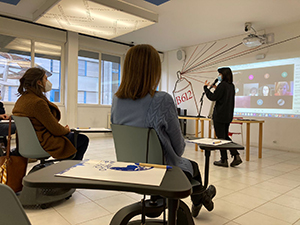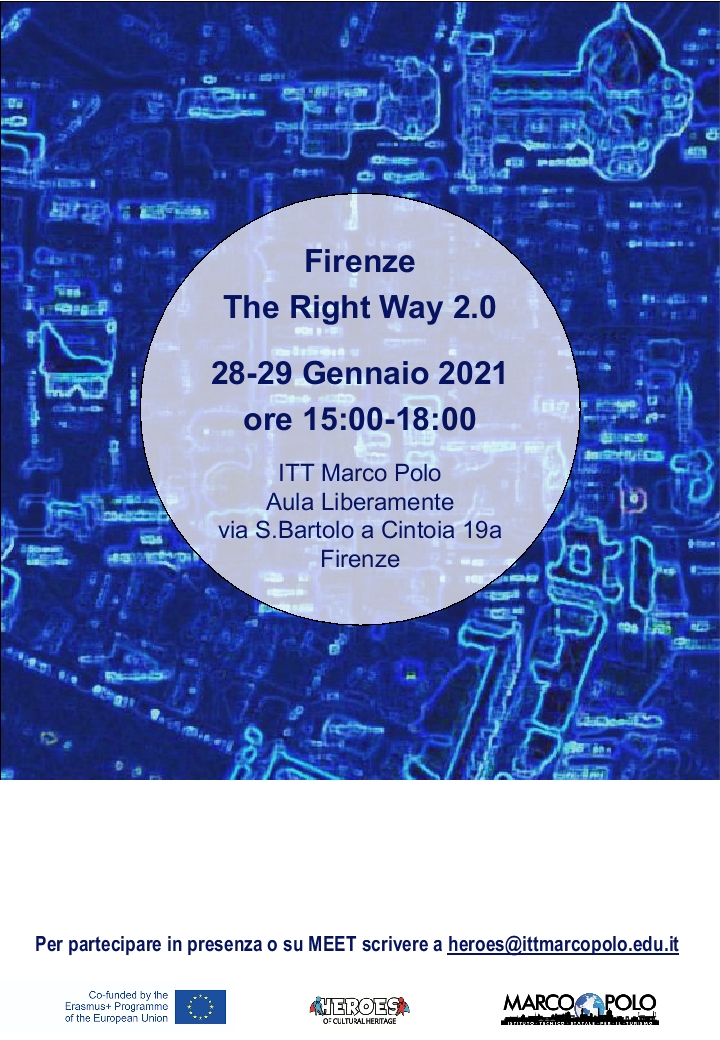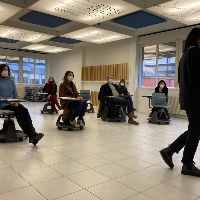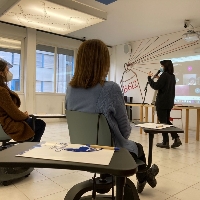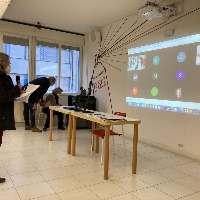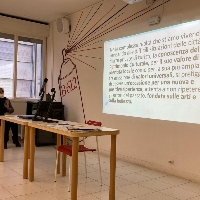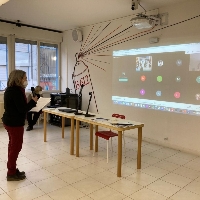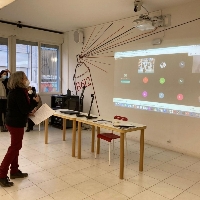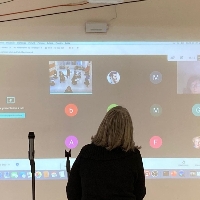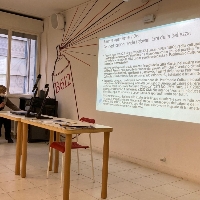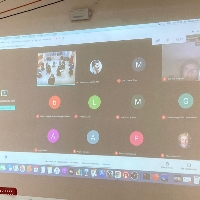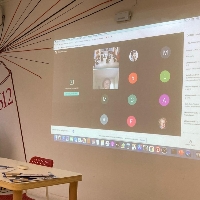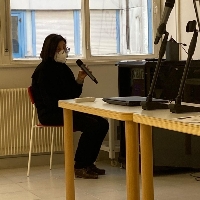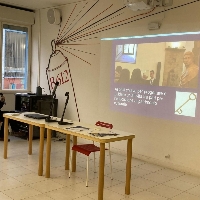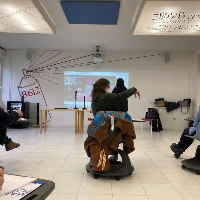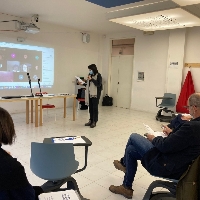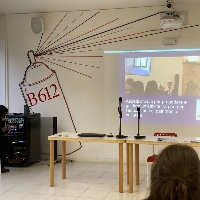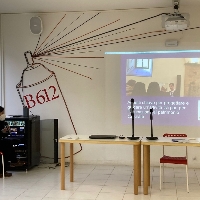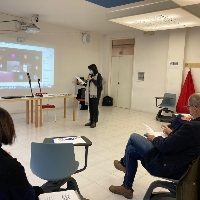Internal Workshop ITT Marco Polo, 28-29 January 2021
January 28th, 2020 was the first day of the “Internal Workshop “organized by the Istituto Tecnico di Turismo Marco Polo for teachers and cultural educators to introduce the first stages of the guidelines for the Heroes model for the framework of the project “Heritage and Culture Roots for Innovative Peer Education Strategies”.
Despite the still critical situation linked to the Covid-19 health emergency,the meeting was held in “dual learning” mode in the newly renovated space Aula Liberamente with ten teachers from the school present, while in distance learning via video conference about 15 teachers from Marco Polo, teachers from other schools in and around Florence, the cultural educators from the School Department of Youth of the Uffizi Gallery,and two international partners of the project, representing EKEDISY,National Centre for Reseach and Preservation of School Material from Athens.With the support of Professoressa Jane Nyhan the workshop was enriched by the translation in English, allowing the Greek partners to interact and intervene, speak in real time with QUESTIONS,and requests for clarification.
The meeting,coordinated by prof.ssa Elena Radicchi, the Business Tourism teacher,Marco Polo Erasmus Referent, and team member of HEROES, opened the workshop introducing the Art History teacher Daniela Bove who gave an interesting historical panorama of the Peer to Peer education methodology. There are traces of the first attempts to apply this method which date back to the Middle Ages with “il mutuo insegnamento “(mutual teaching/learning),then later in the seventeenth century by the protestant pastor, Comenius and in the following two centuries by philanthropists and pedagogists, finding then an extension rather close to the contemporary approach with the School of Don Milani in the second half of the 900.
Peer education is an educational method based on the empowerment of a part of the members of a group, called “Peer Educators”,who train to become the Tutors for the said group. The Peer Educator aims to enhance both the acquiring and sharing of knowledge, as well as Life skills among peers. In the modern approach one establishes a reciprocal sharing of ideas based on a common language through direct contact, and circular communication.
Professoressa Bove’s intervention focused on the importance of the artistic and cultural heritage both material and immaterial to inspire us today, in these particularly hard times, to re-launch the country. ”Il Bello produce bellezza, spingendo l’uomo a nobili azioni” or beauty produces beauty pushing man to noble actions… without forgetting the importance of a scientific approach to include in the implementation of the Peer Education model.
The intervention of Professoressa Bove continued with the illustration of an outline of the model, in which the students are protagonists in the process of building their own professional expertise where the Teacher/Facilitator plays a very important role.The teacher/Facilitator
works to create and promote a climate of collaboration and dialogue between the various participants. Afterwards the main stages of the Peer Education Model were illustrated to the colleagues and guests explaining the details and the layout of the stages for the implementation in the Secondary Schools ( High Schools).
The workshop continued with other interventions from a more practical point of view starting with the Art History teacher Professoressa Paola Cammeo and the Spanish teacher Professoressa Rita Chemeri.
Pofessoressa Cammeo was the first to begin her presentation on the Peer Education activity proposed by Marco Polo, “Firenze per bene 2.0”, a project regarding the training of a group of students from high schools (10th to grade 13,or “triennio”) in the role of guides/ambassadors to provide information to the visitors and residents themselves of the city of Florence who intend to explore its historical, cultural, and natural beauties of their territory.In addition to providing information about hospitality services, leisure time activities, restaurants and cafés, the students’ goal would be to sensitize the residents, tourists, and city users to the good practices and behaviour etiquette for the full fruition and appreciation of the historical city center of Florence.The activity carried out by the students will be mostly peer-to-peer, as the young students will be trained to relate to visitors and citizens of their same age, in other words, young adolescents (millennials).
Professoressa Chemeri highlighted in her speech the importance of the specific need for foreign language skills – which not only enhances communication skills for diversified target audiences, it allows young people to learn how to relate to others on equal terms, “au pair” , and last but not least, it increases one’s self esteem and sense of active citizenship.
At the end of the interventions, Professore Roberto Mannucci’s speech was particularly interesting: he is the Referent for the project “Blog Florence Teen” which he curates at school in collaboration with the city of Florence. Its writers are all under twenty one years of age, and the blog gives suggestions on how to live, explore, and love the city of Florence from young people’s perspective.
The description of a city and its artistic and cultural heritage through projects like Heroes have the potential to foster the reconstruction between “pietra e il popolo” (between the stones and its citizens) a sense of public spirit,geared to young people and their cultural heritage of the territory where they live, even if nowadays it is impossible not to adapt to the recent language of modern day based also on the use of new multimedia technology.
The second day of the Workshop, January 29, 2021, was carried out with activities in 'asynchronous' mode. Participants in the first day were invited to carry out a personal and autonomous reflection on the topics shared the previous day, also with the help and support of materials made available (Summary of the Model Heroes and Florence project card for Bene 2.0). This activity has allowed, through the compilation of a short set of questions, to collect feedback for the implementation and improvement of the Guidelines for the Peer Education Methodology.




